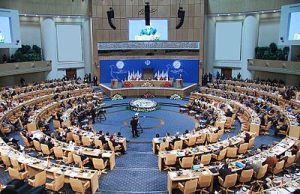As Uganda prepares to host the 19th Non-Aligned Movement Summit (NAM) and the third South Summit (G77+ China) at Speke Resort Munyonyo, Kampala, in January 2024, the International Summits are seen as some of the biggest milestones since Uganda will not only host the summits for the heads of states and governments, but will assume the chairmanship from 2023 to 2026.
Over 5000 delegates and journalists are expected to attend the two summits from the 120 NAM and 134 G77 member states, 18 observer nations, and 10 international organizations. The summits will be anchored in the basic principles of international relations based on the universal ideologies preserved in the Charter of the United Nations as well as the founding principles of NAM and G77+ China.
Taking a look at the history of Uganda and giving it a flash back explains how Uganda as a country has come a long way in achieving her development goals. For her to be honoured and endorsed to host or chair the NAM Summit is a good gesture that Uganda is on the right track to achieving the objectives that aim at deepening cooperation for shared global affluence.
In hosting such major summits, Uganda is destined to earn significant international exposure, mainly in terms of boosting its financial well-being and tourism industry. This is because, as a country that is still in its middle stages of development, it has an opportunity to create and build a strong rapport with other countries through the high-profile Heads of State sharing their good experiences they had in Uganda, which in turn will attract the entire world to visit and have the feel of such experiences.
Through hosting the two major international summits, Uganda will have a chance to be part of a wide and global supportive community from the various member states and will grab an opportunity to be part of the leaders whose thoughts and decisions will eventually have an enduring impact on global citizens.
By hosting the two summits, Uganda will open its market to the outside world since the country is expected to receive several dignitaries from different countries across the globe. This will help boost local businesses in that it will enhance open trade, which in turn will create value addition to the locally made or produced goods. As a result, this will introduce and ease access for local businesses and products to international markets and investors, which in the long run will create value integration between our economies.
Before any country hosts the summits or assumes the chairmanship, there are rudimentary principles that are followed that influence the attainment of the chair, especially peace, security, and democracy.
Uganda was endorsed due to its regional peace and security initiatives with its immediate neighbors. Uganda was the first East African country to deploy troops into Somalia in 2007 under the African Union Mission in Somalia (AMISOM), with the aim of helping restore peace and stability in the region.
Uganda has also sent its forces on peacekeeping missions to the Democratic Republic of the Congo (DRC), the Central African Republic, Southern Sudan, and Equatorial Guinea.
The summits mean that member countries have built strong trust in President Yoweri Kaguta Museveni as a robust patriotic and Pan-Africanist leader whose aim is to ensure good governance and ideological skills, as well as laying a strategy for ensuring the economic development of the country with her neighbours.
Uganda being an outstanding nation and one of the most ethnically diverse countries that hosts extremely loving and hospitable people has attracted many people from the outside world.
Uganda, which is strategically located in the African Great Lakes region, lies within the Nile basin and has a varied but a generally modified equatorial climate. This has resulted in its being called the “pearl of Africa.” The conducive climate has attracted the fastest growth in the country.

